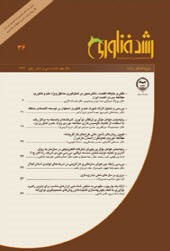بررسی رابطه بین هوش سازمانی و کارآفرینی در شرکتهاي تولیدی استان گیلان
محورهای موضوعی : زيرساختهاي توسعه فناوري و نهادهاي پشتيبان توسعه فناوريحمیدرضا عليپور شيرسوار 1 , عفت مرزبان مقدم 2
1 - -
2 - -
کلید واژه: هوش سازماني, کارآفرینی, شرکتهاي تولیدی استان گیلان, كسب و كار.,
چکیده مقاله :
هدف این پژوهش بررسی رابطه بین هوش سازمانی و کارآفرینی شرکتهاي تولیدی استان گیلان است. كارآفريني، فراينــدي است كه منجر به ايجــاد رضايتمندي و يا تقاضاي جديد ميگردد که عبارت اسـت از فراينـد ايجـاد ارزش از راه تشكيل مجموعه منحصر به فردي از منابع به منظور بهرهگيري از فرصتها. با توجه به اهمیت موضوع و اهداف پژوهش، تحقیق حاضر توصیفی از نوع همبستگی ميباشد. جامعه آماری پژوهش را مدیران شرکتهاي تولیدی استان گیلان تشکیل ميدهد که در سال 1391، از بين 207 مدیر شرکتهاي تولیدی، 119 نفر با روش نمونهگیری تصادفی انتخاب شدند. برای گردآوری دادهها از پرسشنامههاي هوش سازمانی آلبرخت و کارآفرینی رابینزاستفاده شد، پس از تأیید سنجش روایی پرسشنامهها از طریق روش محتوایی و پایایی، از طریق آلفای کرونباخ (87/0= α)، اطلاعات به دست آمده با انجام محاسبات آماری توصیفی و استنباطی (ضریب همبستگی پیرسون) مورد تجزیه و تحلیل قرار گرفت. نتایج حاصل نشان داد که بین تکتک مؤلفههاي هوش سازمانی (بينش راهبردي، سرنوشت مشترك، تمايل به تغيير، جرأت و شهامت، اتحاد و توافق، كاربرد دانش و فشار عملكرد) با مؤلفههاي کارآفرینی (خلاقیت، ریسکپذیری، استقلال طلبی، انگیزش، عزم و اراده، اعتقاد به مقدسات) رابطه معنا داری وجود دارد. به نظر ميرسد برای توسعه شرکتهاي تولیدی علاوه بر ارتقاء ابزارهای هوشمند تولیدی و توجه به فناوری باید سعی در ایجاد تعامل بین نیروی انسانی (به عنوان سرمایههاي هوش سازمانی) و ابزار هوشمند شود.
A survey of relationship between organizational intelligence and entrepreneurship in manufacturing companies of Gilan province is the purpose of this research. Entrepreneurship is a process which leads to creating satisfaction or new demand consisting of the process of value creation from composing of a unique collection of resources in order to take advantage of the opportunities. According to importance of the subject and purpose of the research, this investigation is a description of correlation. Statistical community research contains managers of manufacturing companies of Gilan province, which in 1391, 119 people were chosen among 207 managers of manufacturing companies by random sampling method. For data collection, Albrkht organizational intelligence questionnaires and Robbins entrepreneurship were utilized. After confirmation of validity assessment of the questionnaires through final and content methods, by Grunbakh alpha (a=0.87), the obtained information was analyzed with descriptive statistical calculations and inferential statistics (pearson's correlation coefficient). The results collected demonstrate that there is a meaningful relationship between all components of organizational intelligence (strategic insight, shared fate, willingness to change, assertiveness and courage, alliance and agreement, application of knowledge and push performance) and entrepreneurship components (creativity, risk disclosure, independence, impulse, determination and will power and belief in sacred things). It seems that for manufacturing development, companies should create interaction between labors as organizational intelligence capital and smart tools in addition to upgrading intelligent manufacturing tools as well as noticing to technology.


